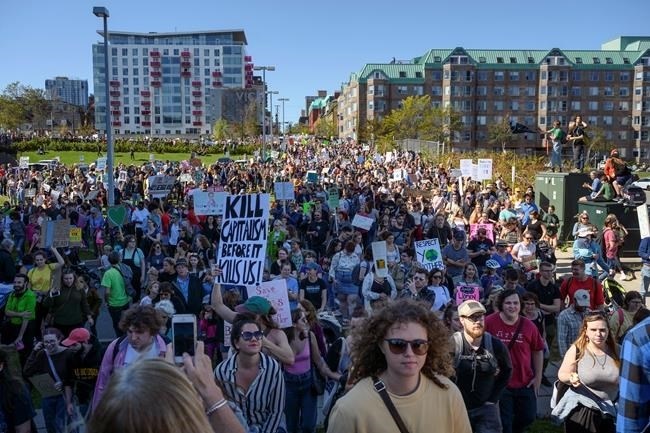
Thousands march on the property of Nova Scotia Power during the climate strike in Halifax on Friday, Sept. 27, 2019.
Image Credit: THE CANADIAN PRESS/Darren Calabrese
September 27, 2019 - 9:00 PM
TORONTO - Throngs of teens and young activists joined climate strike protests across Canada on Friday, demanding action from adults in charge of businesses, government and any group that determines their future on a healthy planet.
Fiery teenage Swedish climate activist Greta Thunberg joined thousands of demonstrators, including young homegrown eco-warriors Samantha Lin of the Vancouver group Sustainabiliteens, and John Nathaniel Gertler and Laura Krochenski, both members of the group Extinction Rebellion and the Dawson Green Earth Club at Montreal's Dawson College.
"These politicians, everyone is just still concerned about their money and getting re-elected and no one wants to prioritize the climate and no one wants to talk about it," says the 17-year-old Lin, who was set to join a Vancouver demonstration.
Gertler says he's often asked what he wants to do when he graduates, but he's consumed by more immediate issues.
"I'm not even really concerned about what I'm going to be doing 15 years, 20 years down the line because I'm so focused on what's going on now," says the 18-year-old, in his first year of Environmental Studies.
Along with 15-year-old water advocate Autumn Peltier of the Wiikwemkoong First Nation, these teens offered up their tips on what average Canadians can do to help the planet.
TALK ABOUT CLIMATE ISSUES
"The more people talk about it, the more you can't ignore it and it's bound to cause some sort of action," says 18-year-old Krochenski.
"I stopped eating meat and a lot of animal products in general and then slowly my parents have started doing the same because they realized, 'Oh, it's not that hard.' And that just kind of what happens. If one person does it, another person will."
Lin says she did the same thing, and it's paid off.
"My parents are both taking the day off work and they booked it off as soon as I told them and I was really excited to hear that. It just meant a lot how supportive they were," says Lin. "That was really super cool to me."
And your actions speak volumes, too, says Gertler: "(If) someone sees that you're taking your bike to school or they see that you're choosing the vegetarian option, it sends a message."
REDUCE FLYING
The global aviation industry produces about two per cent of all human-induced carbon emissions, according to data cited by the Air Transport Action Group.
Gertler urges travellers to avoid flying when possible, "especially when it comes to business, corporate flying."
"If that can be replaced by a Skype call or something like that, it would make a big difference."
LEARN TO SEW, OR HOW TO COMPOST
Krochenski urges less consumption overall, especially when it comes to clothes. She suggests thrift shops, clothing swaps with friends, or wearing hand-me-downs. But the best way? Reuse your own clothes.
"If an old piece of clothing is just not the way you want it, quickly learn how to sew it," says Krochenski.
"I know it sounds difficult but it's taking those little actions that make a difference. Just learning how to reuse those items or simply buy from sustainable clothing companies."
If sewing's not your thing, try learning to compost, she adds.
"It's little things like that that seem complicated at first but if you invest a day in learning about it — if everyone did that — it can make a big difference."
DITCH SINGLE-USE PLASTICS
Peltier urges everyone to reduce plastics in their lives, especially water bottles, balloons, plastic bags and straws: "Going green basically," she says, suggesting "paper straws, and recycling and reusing."
Whenever Krochenski leaves the house, she brings reusable straws, a reusable utensil pack made out of bamboo, and grocery bags.
"If enough people do all these little actions then it's going to become the norm and people that don't do them are going to feel like, 'Maybe I should,'" she says.
And when purchasing, avoid products with packaging — even those labelled as recyclable, she adds.
"Go to a local farmers market when you can," she suggests. "It's all locally made and they won't use excessive packaging."
VOTE
Even those too young to vote can be political, says Gertler, who urges passionate youngsters to get involved in a protest, write their city councillor, and just become politically aware.
But Lin considers voting "the number one most important thing to do."
"I'd say to every adult, every person who can vote: It's your responsibility to look out for the youth of today who can't vote yet."
JOIN A GROUP, AND DEMONSTRATE
"There are so many that exist across Canada for adults, for youth, whoever you are," says Lin.
"We've gotten past the point of trying to live greener and making more personal green upgrades in our lives. While that is important, we're also shifting away from that, we need more climate action, we need more drastic action to really, really bring this issue into the spotlight even more and we need to have more real discussions about it."
Gertler agrees, saying that when individuals come together they can incite bigger change.
"Whether it's a group in a school or community organizations, there are groups like Extinction Rebellion that are in all sorts of big cities. And if there isn't an organization already, make one."
News from © The Canadian Press, 2019